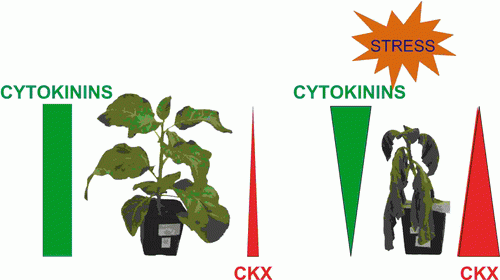Plant Hormones Functions in Ontogenesis and Interactions with the Environment
Development of plants as well as their interactions with environment are regulated by plant hormones. Each phytohormone affects a range of physiological processes and vice versa each process is regulated (in positive or negative mode) by several hormones. Hormones mediate both fast responses (e.g. stomata closure during water deficit) and long-term adaptations, associated with modulation of growth and development. Positive regulators of cell division and growth are predominantly cytokinins and auxins. Negative growth regulator, which plays a decisive role during the seed development as well as in the response to stresses (especially to those associated with water deficit), is abscisic acid.
Temporal and spatial regulation of the levels of physiologically active hormones is very strict (Dobrev et al., Plant Physiol. Biochem. 2002, Nováková et al., J. Exp. Bot. 2005), both at the level of tissues (e.g. developing meristems) and individual cell compartments. Our Laboratory has been involved in the study of hormone cross-talk (Vaňková et al. in Physiology and Biochemistry of Cytokinins 1992), mechanisms involved in the regulation of the levels of physiologically active forms (Veach et al., Plant Physiol. 2003, Blagoeva et al., Physiol. Plant. 2004, Mok et al., Plant Physiol. 2005), elucidation of their role during ontogenesis (Rodo et al., J. Exp. Bot. 2008) and abiotic stress response (Havlová et al., Plant Cell Environment 2008, Gaudinová et al., Physiol. Mol. Plant Pathol. 2009).
Using mass spectrometry we found that tobacco plants respond to water deficit by the establishment of bioactive cytokinin gradient in favour of upper leaves. Elevated cytokinin content enhanced the sink strength of the upper leaves, which was important for their preferential protection. Simultaneously, cytokinins and auxins were accumulated in drought-stressed roots, which seemed to affect positively the primary root growth, crucial for the access to underground water in deeper soil layers (Havlová et al., Plant Cell Environment 2008). Comparison of transgenic tobacco plants with constitutively enhanced cytokinin turn-over and plants with cytokinin elevation driven by senescence induced promoter revealed that enhanced cytokinin content (already before stress initiation) might delay stimulation of defence mechanisms, namely increase of abscisic acid and xanthophyl cycle pigments (Haisel et al., Biol. Plant. 2008).

Regulation of pool of active cytokinins under drought stress.
As abiotic stresses occur in nature usually in combination, we compared heat stress response of well watered and drought stressed plants. High increase of the heat stress strength under the conditions of water deficit indicates the importance of enhanced transpiration for cooling of the leaf surface, at least during the early stage of the response. The observed hormonal changes (transient elevation of cytokinins and simultaneous down-regulation of abscisic acid) are in good correlation with transient stomata opening (Dobrá et al., J. Plant Physiol. 2010).

Dynamics of hormonal changes under heat stress.
Proline represents an important osmolyte, which has protective role especially during the drought stress. When the drought and/or heat stress responses were compared in plants with constitutively elevated proline content and the corresponding wild-type, mild increase of stress tolerance was observed, indicating that abiotic stress tolerance is a complex trait (Dobrá et al., J. Plant Physiol. 2010). Determination of expression profiles of genes for proline biosynthesis and degradation revealed differential regulation of proline content in shoots and roots during the stress progression and subsequent recovery (Dobrá et al., J. Plant Physiol., in press).
Comparison of the effect of modulation of cytokinin metabolism in cytoplasm on their content per whole leaf basis and in isolated chloroplasts revealed substantial autonomy of chloroplasts. These organelles, very important in photosynthesis and thus also in the stress response, have substantial capacity for maintenance of cytokinin homeostasis (Polanská et al., J. Exp. Bot. 2007).
Hormonal changes associated with Blackcurrant reversion virus (BRV) infection were followed in flowers of white currant ´Blanka´ and red currant ´Vitan´. Flower malformation (full blossoms) caused by this virus coincided with elevation of bioactive cytokinins at early flower stage (Gaudinova et al., Physiol. Mol. Plant Pathol. 2009).
In collaboration with the Department of Horticulture and Center for Gene Research and Biotechnology, Oregon State University, Corvallis, Oregon, USA (Prof. Machteld and David Mok and coworkers) we studied the role of cytokinins in sex-specific floral development in maize, using transformants over-expressing gene for trans-zeatin O-glucosyltransferase. Constitutive expression of this gene resulted in the suppression of male flower development coinciding with the delay of leaf senescence (Rodo et al., J. Exp. Bot. 2008).
We participated in the study of novel SOB5 and SOFL proteins, which are involved in modulation of cytokinin signal, performed by Prof. Michael M. Neff, Washington State University, Pullman, USA (Zhang et al., Plant J., 2006, Zhang et al., PLOS ONE, 2009).
In collaboration with the Plant Science Department, University of Connecticut, Storrs, Connecticut, USA (Prof. Richard McAvoy, Dr. Mariya Khodakovskaya) we tested relationship between enhanced cytokinin content and delay in the senescence of both leaves and flowers of petunia and chrysanthemum. Positive correlation indicated potential utilization of hormonal regulations in practice (Khodakovskaya et al., J. Exp. Bot. 2005).
We collaborate particularly with Departments of Genetics and Plant Physiology, Agricultural Research Institute, HAS, Martonvásár, Hungary (Dr. Gábor Galiba and Dr. Tibor Janda and coworkers) on hormonal regulations of cold stress resistance of wheat cultivars and Arabidopsis (Majláth et al., J. Plant Physiol., in press). In the study of responses to extreme temperatures, we further collaborate with Faculty of Agronomy, Mendel University, Brno (Prof. Břetislav Brzobohatý and coworkers) and Institute of Crop Research, Prague (Dr. I. T. Prášil and coworkers). The aim of our work has been characterization of the role of individual plant hormones (especially of cytokinins, auxin and abscisic acid) in the response to extreme temperatures, evaluation of their intensive cross-talk and elucidation of the underlying mechanisms.

